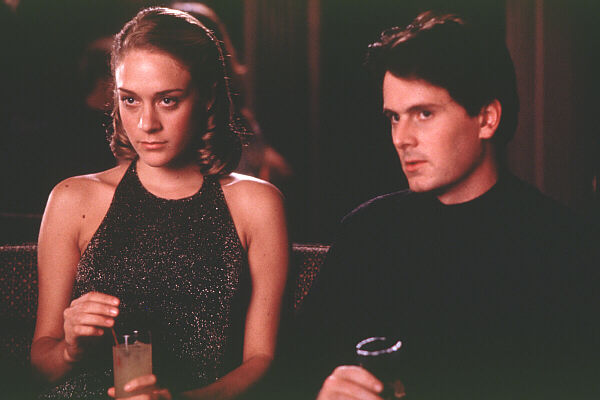
The pleasure of watching a Whit Stillman film is not reliving my past or seeing my future. The youth he portrays in his films is very different from mine. I am not bourgeoisie. I am not in love with disco. I am not from a rich family. I have not read many facinating books. I am not like the characters depicted in these films (Barcelona, Metropolitan, The Last Days of Disco), well, not really. But I recognize these types. I know people, you know? And the realities of the people in Stillman films are not all that different from the realities of people I know, and, well, me too. I admit. I'm like these Disco lovers. There is wonderful pleasure in watching Whit Stillman's work.
Like the group of revolving friends and lovers in The Last Days of Disco, I too have experienced the need to fit in, or in the case of these characters, getting in. They're too self-absorbed to realize that the place they want to get and stay in - the place where they have fun, dance, drink, fall in and out of love, be good friends, and be bad friends - is dying. Disco and this club that they frequent symbolizes the folly and seriousness of youth. And not adolescence. Not being in college. Like few filmmakers, Stillman has a keen sense of the way post-college feels (or what I imagine it feels like). Along with other film's depictions of youth, The Last Days of Disco portrays the urge to fill others expectations of you, or maybe to change how others see you, or maybe even to change the way you see yourself. All of the above. None of the above.
The truth is, these characters only flirt with change. They approach it, but like one character says about the Tramp of Lady and the Tramp, no one really changes. Their context can change, but people never really do. It's a cynical view of society, but the film backs it up.
A Stillman staple is a witty, sophisticated banter/dialogue between characters. What's intriguing is that I've never really heard people in real life talk this way. Even the most mundane, accidental conversation seems planned. But it's never forced. And somehow I believe it. Somehow the reality and truth always shines during even the most artifical scenes.
Sample witty dialogue: Des McGrath: "Yuppie stands for 'young upwardly mobile professional'. Nightclub flunkie is not a professional category. I wish we were yuppies. Young, upwardly mobile, professional. Those are good things, not bad things."
The Last Days of Disco is Whit Stillman's best film. Not only does he guide his best cast to date, but his organization and handling of the distinctive personalities of the film's multiple characters is amazing. Each is complex. Each is real (you know, in that sort of artifical way I semi-explained earlier). And though his other films showed a insight into the life of the privileged, he has never before so accurately displayed an atmosphere. Apparently, Disco was contagious. I never got it before. "Disco?" I asked. "Ugh! Yuck!" I shouted. But it looks like fun. There, I said it. "Disco looks like fun."
****1/2


No comments:
Post a Comment